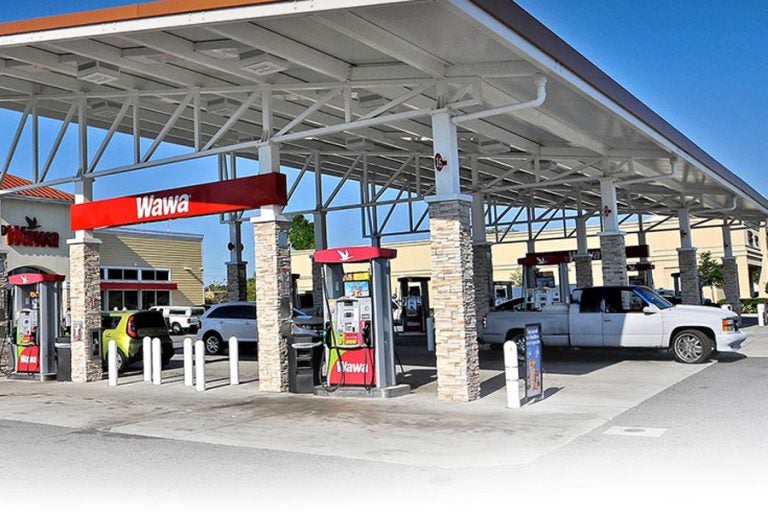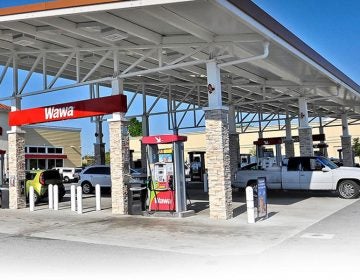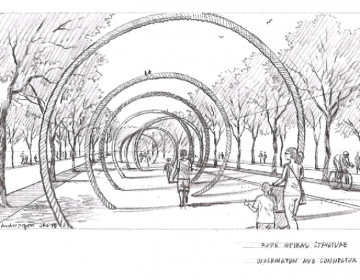City postpones ruling on Bart Blatstein’s Delaware River waterfront Wawa
The battle over Bart Blatstein’s Wawa on the waterfront will continue into 2020.

(Courtesy of Wawa)
The battle over Bart Blatstein’s Wawa on the waterfront will continue into 2020.
Philadelphia’s Zoning Board of Adjustment Tuesday postponed a final decision on the development of a Wawa with gas pumps on land near the Delaware River, citing a shortage of time and the need to hear more perspectives on the issue. The ZBA set Jan. 21 as the next hearing on the project.
That continuance comes after three years of Pennsport residents’ fight against the proposal, and nearly three months of waiting through hearing rescheduling.
Developer Bart Blatstein has been accused of gaming the system with the South Philadelphia property, based on his redrawing of property lines to skirt the rules of a publicly approved Delaware River Waterfront Corporation master plan. But this Tuesday, a final decision was just not in the cards.
Opponents packed the room
This isn’t the first time Blatstein’s proposed a “Super Wawa” — a convenience store and filling station combo — on the waterfront. He’s been remixing and re-proposing the project, which is planned for a lot at 1525 S. Columbus Boulevard, for years. The difference this time is in a blink-and-you’ll miss it design change: switching the location of the fuel pumps with the convenience store and designating a parcel along the edge of Columbus as a landscaping addition and “shared driveway,” so that the Wawa now fronts Tasker Street instead.
As PlanPhilly reported earlier this year, the key difference isn’t in the pictures but in the policy. Moving the filling station and adding a driveway “changes the legal standard upon which the pumps could be permitted,” meaning the minimum standards for zoning approval are lower.
The development has never gotten approval from the Pennsport community. But it might be close to approval from the city. And for Blatstein, that’s all that matters.
The ZBA postponed the initial hearing and scheduled a special hearing for consideration of the Super Wawa in part because they expected a lot of public testimony. But if Blatstein was hoping the postponement would delay or discourage community protest, he was wrong.
The zoning board special hearing was scheduled for 9:30 a.m. By 10 a.m., every seat in the room was filled. The huddle of standing listeners stretched through the double doors and into the hall.
‘The master plan is not law’
Four Pennsport seniors took the bus together on Tuesday morning in order to speak about their rejection of the proposed development. They’ve lived in Pennsport all their lives — more than 70 years — and two of them attended elementary school together. They say they’re speaking for the community that doesn’t want the Super Wawa proposal to pass.
Karen Lemba was concerned about environmental safety on the riverfront. Liz Aros and Marge Petronis mentioned increasing traffic congestion on already-crowded streets. And Irene Black said she was rejecting the fueling station because of its implications in climate change.
“We want to protect our grandchildren,” Black said. “Wawa we have no problem with. But the gas pumps? They’re going to be a problem.”
But in the two hours of the special hearing, none of them got to speak. Instead, Carl Primavera, lead counsel for Tower Investments’ proposal, and his witnesses did.
“The bottom line is that L&I had every opportunity to scrutinize this at every level of government,” Primavera said.
When considering the development, he suggested, the board should focus not on community protest, but on city policy.
The board hands out special exceptions when zoning ordinances are technically permitted under land use laws, provided that the developer can prove special circumstances and demonstrate meeting certain criteria (e.g. parking, design, or traffic criteria) and attend a hearing. At the hearing, any unusual, adverse or unnecessary effects of the proposed development can be considered. In order for any of those effects to make a difference in the city’s final zoning decision, said Primavera, “it has to be extraordinary.”
And the effect of building a convenience store with gas pumps, he argued, “is in no way extraordinary or adverse.”
Primavera brought a civil engineer, two traffic engineers, and an environmental consultant as witnesses, paired with enough diagrams on poster board to outfit an elementary school science fair. They, too, testified that the development would have a “negligible impact.”
What about the DRWC’s master plan, the board asked?
“The [DRWC’s] master plan is not law. We have an ordinance of City Council that says this is a special exception, and the wisdom of City Council trumps the wisdom of anybody,” Primavera said. “The master plan wants all these cars and all these trucks to go away, I get it. But the law is what we’re talking about.”
Why one gas station matters
Finally, Blatstein’s team argued, the special exemption should be granted because, well, what’s the big deal?
“I don’t think one small one-acre property is going to detract from the vision for the waterfront,” Primavera told the board.
Almaz Crowe, director of communications for the Delaware River Waterfront Corporation, disagreed. Sure, she said after the hearing, the space itself might be small. “But we look at every development, and we know that incremental changes equal big changes,” she added.
“It’s a big deal. It’s not small, it’s not minor, it matters,” she added. “Not just as what it is, but as a precedent for other development.”
And maybe it’s the promise of development that Blatstein’s team just doesn’t see. Is the DRWC’s plan accelerating, or just aspirational? Is the city developing for the waterfront it has or the one it wants in the future?
“This is a very autocentric area, and gas stations are compatible with that existing [character],” said Jill Blumhardt, the environmental consultant that Primavera called as witness. “I understand that there’s a mixed-use vision. But that could take a long time.”
But Joseph Forkin, president of the DRWC, says that’s not the point. Primavera’s claim that the Wawa is small and therefore unimportant is “patently — I mean, it’s a small piece of land with a large impact,” he said. “And so downplaying the size of a piece of land, versus the use and what that use would do to a plan, it’s just not genuine.”
Since announcing the master plan, the DRWC has invested $60 million in bringing that plan to life. In the Pennsport area directly surrounding the site, they’ve already invested nearly $10 million in land acquisition, trail construction, park construction, and connector street programs. Implementation of Blatstein’s proposal, Forkin said, would essentially “throw that $10 million out the window.”
“There’s very few people that actually want this use to occur,” Forkin said. “No one wants to take a step backward, which is really what this proposal is. It’s saying, you know, let’s not strive for something better, let’s just put the lowest common denominator here. And it would ruin that site for generations.”
WHYY is your source for fact-based, in-depth journalism and information. As a nonprofit organization, we rely on financial support from readers like you. Please give today.







